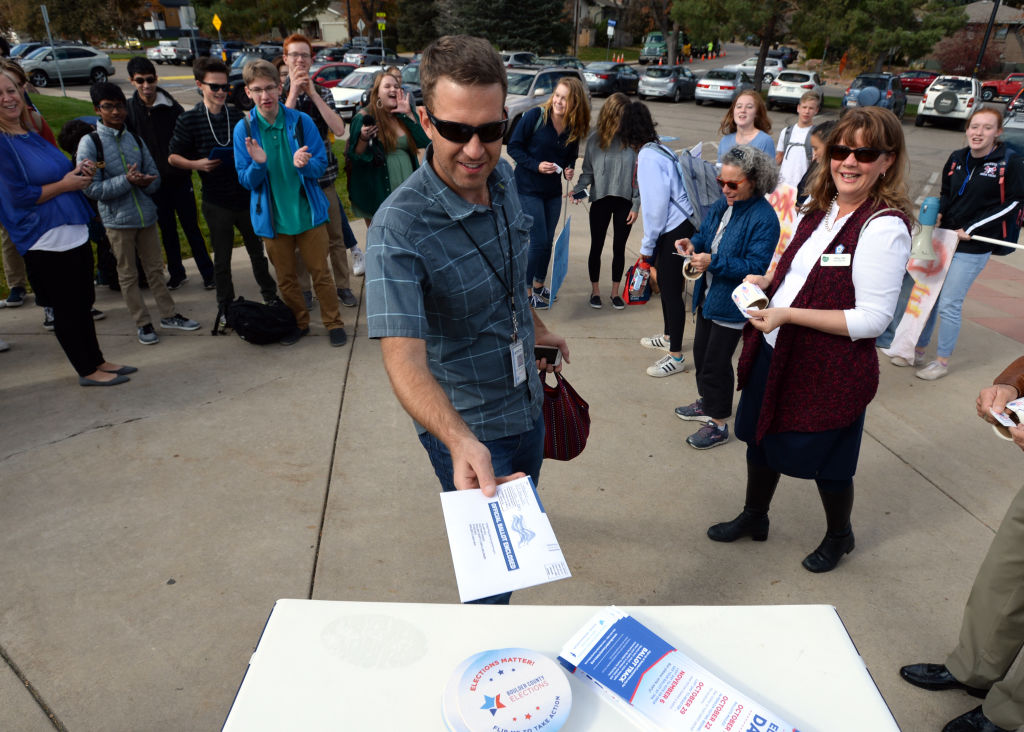
In the midterms, the much-maligned American voter managed a pretty remarkable feat. Given an unpopular president and the widespread conviction that the nation is headed in the wrong direction on the Democrats’ watch, but confronted with a Republican slate dotted with dubious candidates and a GOP beholden to Trump’s cult of personality, voters collectively managed to thread the needle.
Voters delivered thumping wins to governors who’d reopened their states and their schools, voted for normal adults of both parties, rejected the raft of kooky challengers that Republicans had put up in many races (including all nine statewide candidates who campaigned on Trump’s election conspiracy theories), and gave Republicans narrow control of the House—providing a check on the Biden administration.
In short, voters did their job. Now, it’s time those charged with rearing the next generation of citizens do their job.
In the days after Donald Trump eked out his presidential victory in 2016, American education was swept by an astonishing wave of enthusiasm for civic education. As longtime proponents of civics education (and, in Hess’s case, as a one-time high school civics teacher), we regarded this as a welcome development. At the same time, however, the enthusiasm often seemed more about progressive catharsis than promoting fidelity to civic virtue.
After all, civics education today frequently seems less intent on teaching the necessity of virtue in self-government, the nature of America’s political institutions, or the benefits of checks and balances, and more on celebrating political engagement. Indeed, this fall, a new RAND survey of K-12 teachers found that more K-12 teachers think civics education is about promoting environmental activism than “knowledge of social, political, and civic institutions.”
That’s nuts. For one, this suggests that too many teachers think of civics instruction as a chance to promote a particular policy agenda. It’s hard to imagine that teachers who are more concerned about environmental activism than civic institutions when they’re asked about civics education are inclined to help students critique the Green New Deal. That impulse echoes the conceit of “Action Civics,” a popular curricular approach which unapologetically emphasizes activism rather than civic knowledge or responsibility.
More fundamentally, fixating on activism misses the point of civics education. That’s been a long-running problem. If the past few years have taught us anything, it should be that political participation alone doesn’t safeguard self-government or the health of the republic. Rather, it must be leavened with appreciation for how our government works and the ways in which it has secured our liberty and allowed for profound social, political, and economic betterment over the course of more than two centuries.
Yet, a 2019 RAND survey of the nation’s social studies teachers found that just 43 percent think it’s absolutely essential for students to understand historical periods such as the American Founding—this represented a 20-point drop from a decade before. Barely half of social studies teachers deemed it essential that students understand concepts like the separation of powers or checks and balances. And a remarkable 47 percent rejected the idea that it’s essential that students learn to “be respectful of authority.”
It’s easy to see the fruits of this neglect. A large majority of college students say they’re fearful to speak their views on campus, and over 60 percent assert that it’s at least sometimes okay to shout down speakers who disagree with them. Twenty-three percent even think violence an acceptable way to silence a disagreeable speaker. The University of Pennsylvania’s Annenberg Public Policy Center has reported that just 26 percent of Americans could name the three branches of government. The Woodrow Wilson Foundation has estimated that only 1 in 3 Americans could pass the nation’s Citizenship Test.
This is why the fixation on civic activism is so misguided. If most Americans can’t even pass the Citizenship Test, encouraging political activism isn’t the solution. In fact, it’s hard to imagine what could be more self-destructive to the democratic project than encouraging students who can’t name the three branches of government to vigorously, vociferously demand that they get their way. It doesn’t take great insight to imagine such students feeling entitled to dismiss or shout down those who disagree.
Students need to learn that self-government requires citizens who appreciate that disagreement is a healthy, inevitable part of the democratic process and that the legitimacy of institutions shouldn’t depend on whether we like the outcome of a given election, court case, or legislative vote. The American democratic tradition is not that we should expect to be happy with each result, but that we’ll get our say, our rights will be protected, and the rules will be fairly applied.
Students supporting the candidates or causes they like is a good thing. Truthfully, though, it’s also the easy part of civic education. Tougher and more important are the skills, knowledge, and habits of mind that it takes to make the machinery of self-government work. Here’s hoping that schools can rise to the challenge.
More Must-Reads from TIME
- How Donald Trump Won
- The Best Inventions of 2024
- Why Sleep Is the Key to Living Longer
- Robert Zemeckis Just Wants to Move You
- How to Break 8 Toxic Communication Habits
- Nicola Coughlan Bet on Herself—And Won
- Why Vinegar Is So Good for You
- Meet TIME's Newest Class of Next Generation Leaders
Contact us at letters@time.com